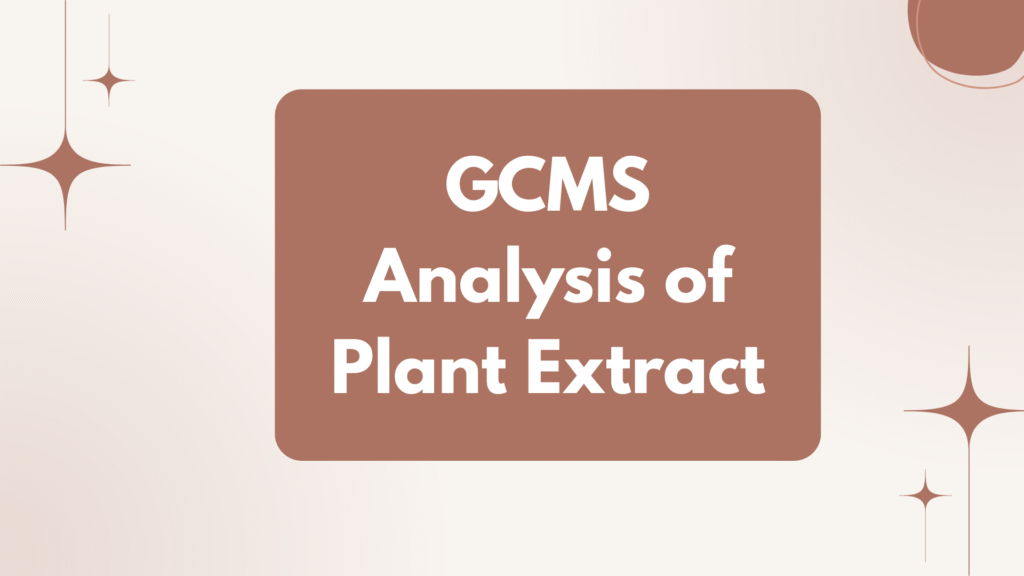.
.
.
GCMS Analysis of Plant Extract

Accurate Phytochemical Profiling by ResolveMass Laboratories Inc.
At ResolveMass Laboratories Inc., we provide professional GCMS Analysis of Plant Extracts to detect, measure, and characterize volatile and semi-volatile compounds within complex botanical samples. Our advanced Gas Chromatography–Mass Spectrometry (GC-MS) platforms are managed by skilled analytical chemists who guarantee accuracy, repeatability, and verified results for research and product innovation.
Why Choose GCMS Analysis for Plant Extracts?
GC-MS is among the most effective techniques for detailed phytochemical studies. It enables researchers to:
- Identify and quantify bioactive constituents
- Determine the chemical profile of medicinal plants
- Support quality control and product verification
- Advance formulation development in pharmaceuticals, nutraceuticals, and cosmetics
Our team employs advanced GCMS methodologies to uphold the highest standards of analytical precision and data reliability.
Our Expertise in GCMS Analysis of Plant Extracts
With extensive experience in analytical chemistry, ResolveMass Laboratories Inc. delivers customized GCMS analysis solutions across diverse sectors. Our scientists have contributed to peer-reviewed publications and collaborate with academic institutions, ensuring credibility and scientific excellence.
All analyses are performed following ISO/IEC 17025:2017-compliant procedures, maintaining rigorous quality assurance from start to finish.
Applications of GCMS Analysis in Botanical and Herbal Research
Our GC-MS services assist researchers and manufacturers in:
- Identifying major phytochemicals in herbal preparations
- Detecting trace-level contaminants and residual solvents
- Enhancing extraction efficiency and solvent optimization
- Supporting regulatory submissions and label accuracy
Explore related services:
👉 Residual Solvent Testing
Learn more about our expertise in:
👉 GC-MS Methods
How Our GCMS Workflow Delivers Reliable Outcomes
- Sample Preparation: Standardized extraction and purification processes
- Chromatographic Separation: Controlled temperature programming for optimal resolution
- Mass Spectrometric Detection: High-resolution compound analysis
- Data Interpretation: Advanced library comparison and spectral verification
- Comprehensive Reporting: Clear, traceable, and publication-ready documentation
Industries We Serve
Our GC-MS testing of plant extracts supports:
- Pharmaceutical development teams
- Herbal and botanical manufacturers
- Food and flavor industries
- Nutraceutical producers
- Academic and government research facilities
Contact ResolveMass Laboratories Inc.
Looking for expert GCMS Analysis of Plant Extracts for your next project?
Connect with our analytical chemistry professionals today:
Frequently Asked Questions (FAQs) on GCMS Analysis of Plant Extract
GC-MS (Gas Chromatography–Mass Spectrometry) analysis identifies and measures volatile components in plant extracts. It separates complex mixtures using gas chromatography and detects individual molecules through mass spectrometry, offering both identification and quantification.
HPLC focuses on non-volatile compounds, while GC-MS is superior for analyzing volatile and semi-volatile molecules such as terpenes, essential oils, and aromatic constituents, offering exceptional sensitivity and specificity.
Generally, 10–50 mg of dried extract or 1–2 mL of liquid extract is sufficient. Requirements may vary depending on the sample complexity and analytical scope.
The extract is filtered, concentrated, and may undergo derivatization to enhance volatility and detectability.
Yes. GC-MS is the preferred analytical technique for identifying residual solvents in botanical and pharmaceutical materials. Learn more in our Residual Solvent Testing section.
GC-MS is best suited for compounds that can vaporize without decomposition. Non-volatile molecules such as polysaccharides require LC-MS analysis instead.
ResolveMass Laboratories applies validated calibration standards and spectral libraries, achieving identification confidence levels above 95% with excellent reproducibility.
Conclusion
In conclusion, GCMS Analysis of Plant Extracts at ResolveMass Laboratories Inc. provides validated, reliable, and scientifically robust data on the chemical composition of botanical samples. Partner with us to advance your phytochemical research with confidence and precision.
Ready to get started?
👉 Contact ResolveMass Laboratories Inc. Today
References
- Upadhyay, R., Patel, K., & Upadhyay, U. (2023). A review article on advancements in GC-MS. International Journal of Pharmaceutical Research and Applications, 8(2), 54-59. https://doi.org/10.35629/7781-08025459
- Moramreddy, L. H. B., Parameswari, S. A., & Gopinath, C. (2013). A review on GC-MS and method development and validation. International Journal of Pharmaceutical Quality Assurance, 4(3), 42-51. Retrieved from https://impactfactor.org/PDF/IJPQA/4/IJPQA,Vol4,Issue3,Article3.pdf
- Sánchez-Guijo, A., Hartmann, M. F., & Wudy, S. A. (2013). Introduction to gas chromatography-mass spectrometry. In Methods in Molecular Biology (Vol. 1065, pp. 27–44). https://doi.org/10.1007/978-1-62703-616-0_3